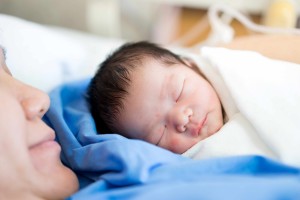Congenital disorders
Healthy start: ADHS Lab checks the health of Arizona’s newborns
Each year since 2010, Arizona parents have brought an average of 80,000 newborns into the world! And each year, health professionals at the Arizona State Public Health Laboratory conduct laboratory testing of around 160,000 blood spot specimens annually to make sure those newborns have the best possible health to begin their lives.
ADHS follows the Recommended Uniform Screening Panel (RUSP), a list of disorders that the Department of Health and Human Services (HHS) recommends for states to screen as part of their state universal newborn screening programs. Disorders on the RUSP are chosen based on evidence that supports the potential net benefit of screening, the ability of states to screen for the disorder, and the availability of effective treatments. Arizona is one of the ten states that adopted the RUSP alignment. When a new condition is added to the RUSP, ADHS will have two years to implement the screening of the additional condition.
Established at the State Public Health Laboratory in 1993, the Office of Newborn Screening started screening Arizona newborns for seven disorders. Currently, our scientists screen newborns for 35 rare but treatable core disorders. The testing is also used to screen for an additional 26 rare but treatable secondary disorders on the RUSP.
Arizona is one of 13 states that use the two-screen model. The first screen is recommended to be collected between 36 and 48 hours after birth and the second screen is recommended to be collected between 5 and 10 days of age. Arizona adopted the two-screen model since some disorders, including severe, later-onset, or milder forms of the disorders might be missed from the first screen. This is the reason why the second screen is recommended between 5 to 10 days of age to catch anything that might have missed on the first. In addition, newborns are screened for hearing and congenital heart defects at the birthing facilities before discharge.
The goal of the program is to identify newborns with certain congenital disorders that can affect a child’s long-term health or survival as soon as possible and connect the infants to early care and treatment. On average, the program identifies around 120 newborns with these genetic disorders and 200 newborns with hearing disorders annually. Working with other ADHS programs and other external partners, the program also provides assistance to the families of the affected newborns.
Visit our website for more information about the newborn screening program. In addition you can listen to the podcast – The Parenting Brief- Newborn Screenings: What to Expect – to learn more about what to expect from your baby’s newborn screening. The podcast is hosted by Jessica Stewart-Gonzales, ADHS Program Director for the Maternal, Infant, and Early Childhood Home Visiting Program, and includes important information from Fran Altmaier, ADHS case management coordinator.
Here are some additional resources new parents might want to explore about newborn screening:
NewSTEPS: This site provides a national newborn screening resource center designed to provide data, technical assistance and training to newborn screening programs and assist states with quality improvement initiatives.

